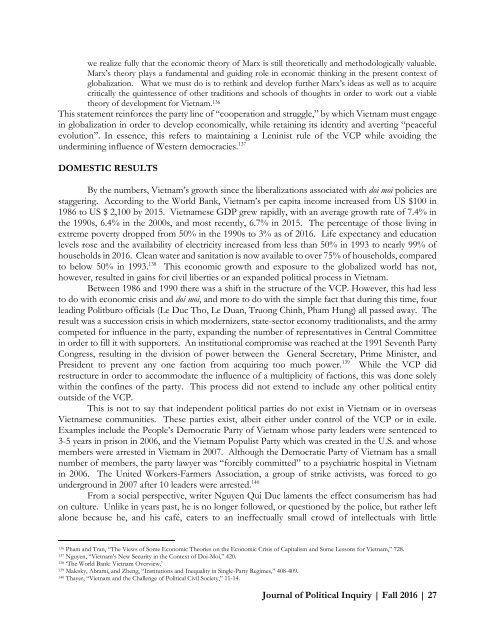Fall2016_Final
Create successful ePaper yourself
Turn your PDF publications into a flip-book with our unique Google optimized e-Paper software.
we realize fully that the economic theory of Marx is still theoretically and methodologically valuable.<br />
Marx’s theory plays a fundamental and guiding role in economic thinking in the present context of<br />
globalization. What we must do is to rethink and develop further Marx’s ideas as well as to acquire<br />
critically the quintessence of other traditions and schools of thoughts in order to work out a viable<br />
theory of development for Vietnam. 136<br />
This statement reinforces the party line of “cooperation and struggle,” by which Vietnam must engage<br />
in globalization in order to develop economically, while retaining its identity and averting “peaceful<br />
evolution”. In essence, this refers to maintaining a Leninist rule of the VCP while avoiding the<br />
undermining influence of Western democracies. 137<br />
DOMESTIC RESULTS<br />
By the numbers, Vietnam’s growth since the liberalizations associated with doi moi policies are<br />
staggering. According to the World Bank, Vietnam’s per capita income increased from US $100 in<br />
1986 to US $ 2,100 by 2015. Vietnamese GDP grew rapidly, with an average growth rate of 7.4% in<br />
the 1990s, 6.4% in the 2000s, and most recently, 6.7% in 2015. The percentage of those living in<br />
extreme poverty dropped from 50% in the 1990s to 3% as of 2016. Life expectancy and education<br />
levels rose and the availability of electricity increased from less than 50% in 1993 to nearly 99% of<br />
households in 2016. Clean water and sanitation is now available to over 75% of households, compared<br />
to below 50% in 1993. 138 This economic growth and exposure to the globalized world has not,<br />
however, resulted in gains for civil liberties or an expanded political process in Vietnam.<br />
Between 1986 and 1990 there was a shift in the structure of the VCP. However, this had less<br />
to do with economic crisis and doi moi, and more to do with the simple fact that during this time, four<br />
leading Politburo officials (Le Duc Tho, Le Duan, Truong Chinh, Pham Hung) all passed away. The<br />
result was a succession crisis in which modernizers, state-sector economy traditionalists, and the army<br />
competed for influence in the party, expanding the number of representatives in Central Committee<br />
in order to fill it with supporters. An institutional compromise was reached at the 1991 Seventh Party<br />
Congress, resulting in the division of power between the General Secretary, Prime Minister, and<br />
President to prevent any one faction from acquiring too much power. 139 While the VCP did<br />
restructure in order to accommodate the influence of a multiplicity of factions, this was done solely<br />
within the confines of the party. This process did not extend to include any other political entity<br />
outside of the VCP.<br />
This is not to say that independent political parties do not exist in Vietnam or in overseas<br />
Vietnamese communities. These parties exist, albeit either under control of the VCP or in exile.<br />
Examples include the People’s Democratic Party of Vietnam whose party leaders were sentenced to<br />
3-5 years in prison in 2006, and the Vietnam Populist Party which was created in the U.S. and whose<br />
members were arrested in Vietnam in 2007. Although the Democratic Party of Vietnam has a small<br />
number of members, the party lawyer was “forcibly committed” to a psychiatric hospital in Vietnam<br />
in 2006. The United Workers-Farmers Association, a group of strike activists, was forced to go<br />
underground in 2007 after 10 leaders were arrested. 140<br />
From a social perspective, writer Nguyen Qui Duc laments the effect consumerism has had<br />
on culture. Unlike in years past, he is no longer followed, or questioned by the police, but rather left<br />
alone because he, and his café, caters to an ineffectually small crowd of intellectuals with little<br />
136<br />
Pham and Tran, “The Views of Some Economic Theories on the Economic Crisis of Capitalism and Some Lessons for Vietnam,” 728.<br />
137<br />
Nguyen, “Vietnam’s New Security in the Context of Doi-Moi,” 420.<br />
138<br />
‘The World Bank: Vietnam Overview.’<br />
139<br />
Malesky, Abrami, and Zheng, “Institutions and Inequality in Single-Party Regimes,” 408-409.<br />
140<br />
Thayer, “Vietnam and the Challenge of Political Civil Society,” 11-14.<br />
Journal of Political Inquiry | Fall 2016 | 27
















